Triple Forum
Global session discusses construction of new multilateralism for developing countries
June 13, 2025 09h09 AM | Last Updated: June 18, 2025 03h24 PM
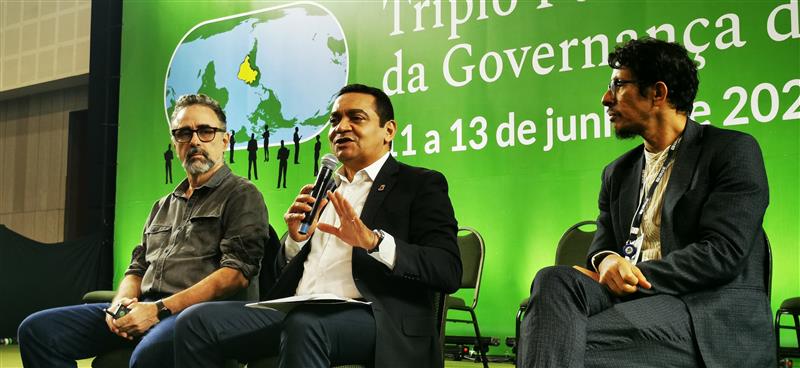
José Meneleu, Hidelbrando Soares and Daniel Castro discuss new perspectives to global multilateralism - Picture: @graoamarca
The need to rethink the model of international cooperation in face of persistent power asymmetries between countries guided the discussions of the Global Session, held on Thursday morning (12) in the Triple Forum, organized by the IBGE in partnership with the government of the State of Ceará on June 11-13, at the Ceará Events Center (999 Washington Soares Avenue, West Pavilion access, gate C).
Registration for the session on Youth Indicators and thematic sessions this afternoon (13) can still be made. Take a look at the schedule on the event´s portal, which is supported by the United Nations Development Program (UNDP), Bank of the Northeast of Brazil (BNB), United Nations Children´s Fund (UNICEF), Ceará Without Hunger, Company of Participation and Assets Management of Ceará S.A. (Ceará Par), Secretariat of Tourism of Ceará, National Secretariat of Youth - General Secretariat of the Presidency of the Republic and other partners. Plenary sessions will be streamed through IBGE digital, and through the IBGE´s official channels IBGE Digital, YouTube, Instagram, TikTok and Facebook.
Moderated by Hidelbrando Soares, Dean of the State University of Ceará (UECE), the session followed the theme “Multilateralism under the Perspective of the Global South in the Digital Era” and counted with the participation of José Daniel Castro, Coordinator General of the IBGE´s Center for Information Documentation and Dissemination (CDDI) and of the Director of social Policies and Studies of the Institute of Research and Economic Strategy of Ceará (IPECE), José Meneleu Neto. Watch the video here.
It aimed at dealing with power reconfigurations in the current geopolitical order, in which Global South countries claim a greater protagonism in the international governance. The discussion approached the cooperation strategies between BRICS, Mercosur and CPLP countries aimed at strengthening their political positions and at advancing their own development agendas.
"This theme somewhat synthesizes what is being discussed in the Triple International Forum of the Global South Governance", highlighted Soares in the opening speech. For the UECE´s dean, multilateralism can serve as a strategy to foster a more sustainable, equitable and respectful development between countries. Therefore, events like the Triple Forum suits to build an international governance established within the principles of common good, useful for jointly facing the persistent challenges like chronic poverty and hunger.
Daniel Castro, in his turn, stated that multilateralism does not involve only a concept, but rather a practice that goes beyond the local decision. "In multilateralism, everything is shared. If you discover a vaccine, it can save humanity," highlighted him. The CDDI´s Coordinator General approached models of global governance and economic cooperation, highlighting the role of some leaders like Brazil and China and the universalization of health and education. He reinforced that multilateralism is founded on a system of reduction of inequalities, monetary balance and promotion of innovation between countries.
The advent of new challenges, including the technological ones, and the emergence of Global South countries in the context of the international relations highlighted power asymmetries, which requires a new multilateralism, advocated José Meneleu Neto. According to the researcher, it imposes the discontinuation of a model founded on the dynamics of the post-World War II, in which these countries had a different role.
Multilateralism, balance and scientific innovation as development pillars
Another key point discussed during the meeting was the role of industry and innovation in the development of the Global South, a theme approached by the three session members.
José Meneleu, an economist and IPECE´s director, suggested to think about the challenge of multilateralism under the point of view of thermodynamics. The use of Physics laws, through an analogy, was used as a resource to reflect on how countries can reorganize the global dynamics aiming at the sustainable development. According to the researcher, economy follows similar principles as those that structure physical systems: energy conservation, entropy (disorder), balance and the impossibility of a perfect order should be considered in the development of strategies within multilateralism.
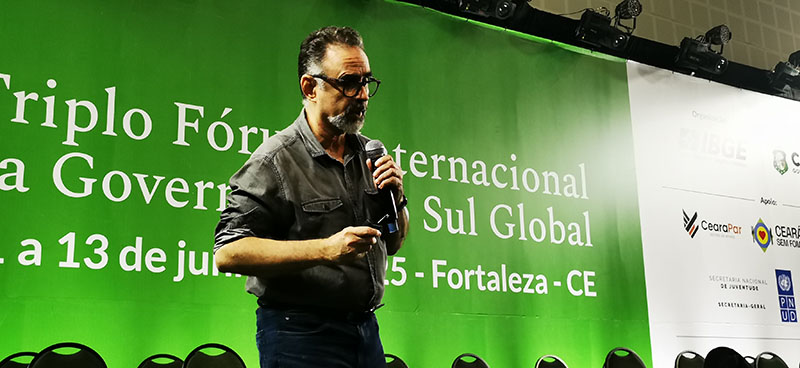
Meneleu Neto explained the importance of balance within multilateralism - Picture: @graoamarca
"A minimal balance should exist between the global systems," stated him. Disorder and randomness (entropy) are an inevitable component of these relations, though institutions should develop resilient systems to face issues concerning the economic order. Therefore, multilateralism arises as an essential tool for the global development, and should not be weakened by unilateral actions, which lead to the systemic instability. In the current perspective, country decisions have even more power to produce global imbalances rather than only domestic damages, argued him.
"There is no unilateral gain without producing losses. A cooperative system is better. Multilateralism is based on the idea of working the principle of cooperation as a way of social and economic rationality," highlighted Meneleu. Nevertheless, fighting against the current hegemony should not imply in the replacement for a Global South hegemony, but rather a model based on cooperativism, without any hegemonic aspiration.
Concerning sustainable development and the use of the energy matrixes, Meneleu sustained that this transition should aim at environmental and economic balance, avoiding any setback, yet following the dynamics of the economic system and assessing what pays off under the ecological point of view, under an international perspective.
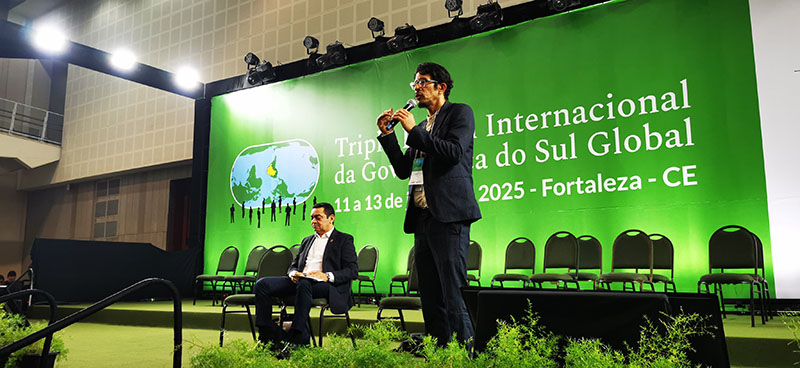
Daniel Castro highlighted the importance of international cooperation in the reduction of inequalities - Picture: @graoamarca
Narratives have a key role within the development dynamics of southern countries, especially in the agendas of higher sociopolitical impact, pointed out Daniel Castro. "Sometimes the discussion is in the narrative. We don´t understand our importance," stated him. The CDDI´s Coordinator General also stressed that countries and their population perceive their potentialities in this process.
Later, UECE´s Hidelbrando Soares highlighted the value of the digital era and the strategic role of universities in the production of collaborative knowledge about the major dilemmas of today. He also advocated the development of a model of governance and national projects aimed at strengthening South-South multilateralism, based on science, technology and innovation, able to cast Brazil and other BRICS countries as key players in strategic sectors.
Teachers, managers and students of the public network participate in the discussion
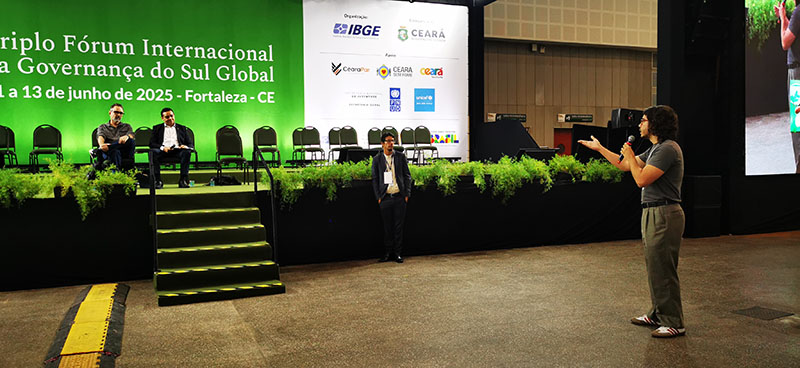
Teachers, managers and students asked questions to speakers - Picture: @graoamarca
After the presentations, the session continued with two rounds of questions aiming at opening the discussion with the public. The interaction was marked by a multiplicity of profiles among those who questioned the speakers. Teachers of the state education network, municipal managers, undergraduate and secondary students had the opportunity to raise their questions and participate in the discussion.
In the first round, the questions were related to the role of the Big Techs and the creation of data centers under a multilateralist perspective. Hegemony changes in the current geopolitical order and the limits of the Global South in this process were approached as well. In addition, questions on what are possible contradictions between the exploitation of the energy matrix, sustainable development and economic advance in Brazil were made.
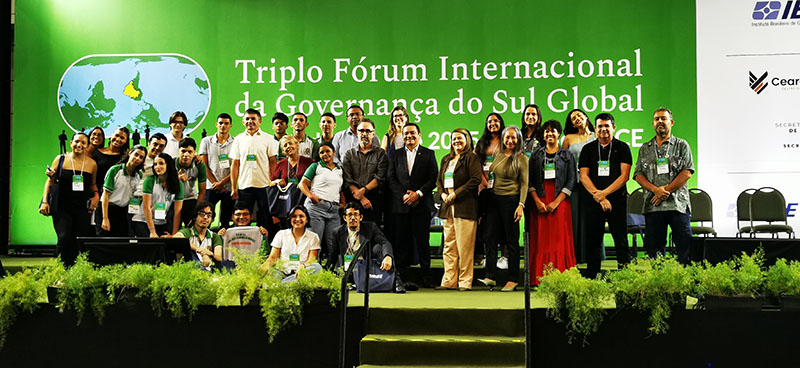
Students of the public network participate in the event - Picture: @graoamarca
The second round counted with questions on the use of technological tools and possibilities of digitalization in statistical surveys; strategies to avoid brain drain caused by the evasion of researchers and professionals in developing countries; and what are the current threats to multilateralism, especially in the Global South countries.
The discussion was considered fruitful and instigating, with a broad participation of the public and engagement of the speakers, who deepened the reflections proposed and reinforced the urgency of rethinking the models of international cooperation and positioning before contemporary challenges.
About the event
The Triple Forum was organized by the Brazilian Institute of Geography and Statistics (IBGE) in partnership with the Government of the State of Ceará on June 11-13 at the Ceará Events Center (999 Washington Soares Avenue, West Pavilion access, gate C). Take a look at the schedule on the event´s portal, which is supported by the United Nations Development Program (UNDP), Bank of the Northeast of Brazil (BNB), United Nations Children´s Fund (UNICEF), Ceará Without Hunger, Company of Participation and Assets Management of Ceará S.A. (Ceará Par), Secretariat of Tourism of Ceará, National Secretariat of Youth - General Secretariat of the Presidency of the Republic and other partners. Plenary sessions will be streamed through IBGE digital, and through the IBGE´s official channels IBGE Digital, YouTube, Instagram, TikTok and Facebook.




















